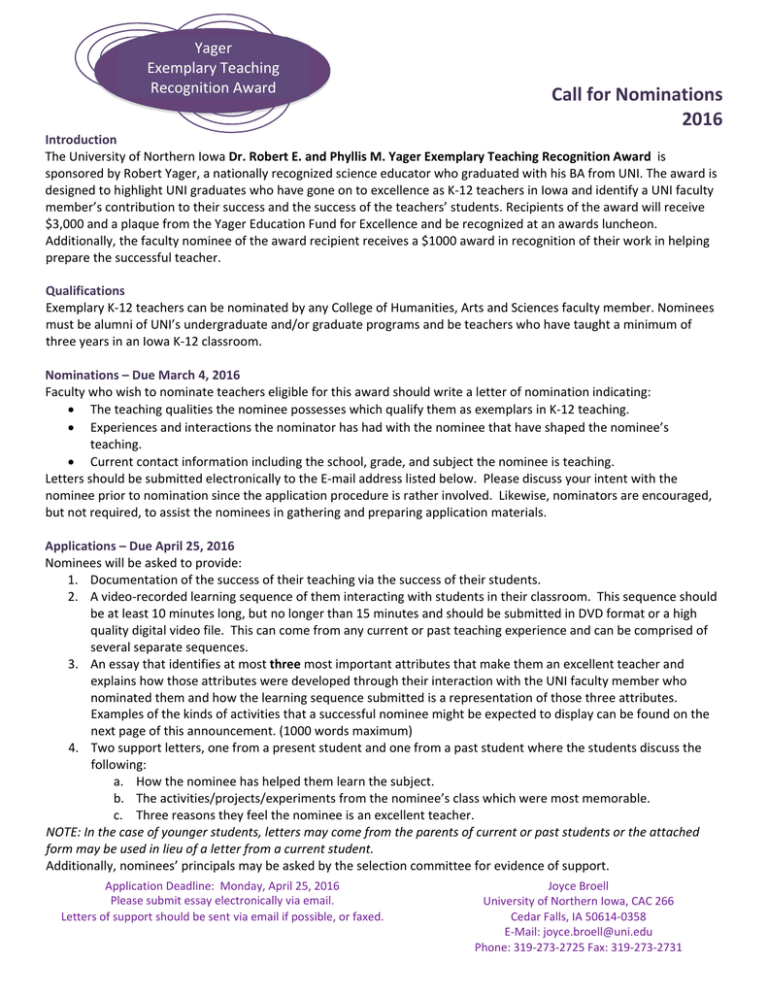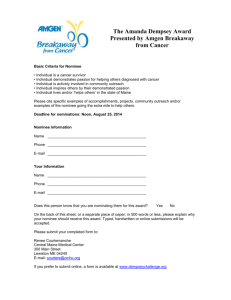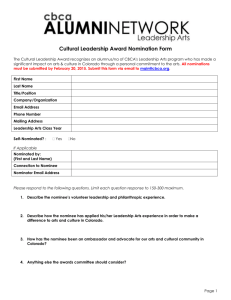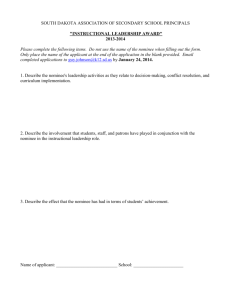Call for Nominations 6 201 Yager
advertisement

Yager Exemplary Teaching Recognition Award Call for Nominations 2016 Introduction The University of Northern Iowa Dr. Robert E. and Phyllis M. Yager Exemplary Teaching Recognition Award is sponsored by Robert Yager, a nationally recognized science educator who graduated with his BA from UNI. The award is designed to highlight UNI graduates who have gone on to excellence as K‐12 teachers in Iowa and identify a UNI faculty member’s contribution to their success and the success of the teachers’ students. Recipients of the award will receive $3,000 and a plaque from the Yager Education Fund for Excellence and be recognized at an awards luncheon. Additionally, the faculty nominee of the award recipient receives a $1000 award in recognition of their work in helping prepare the successful teacher. Qualifications Exemplary K‐12 teachers can be nominated by any College of Humanities, Arts and Sciences faculty member. Nominees must be alumni of UNI’s undergraduate and/or graduate programs and be teachers who have taught a minimum of three years in an Iowa K‐12 classroom. Nominations – Due March 4, 2016 Faculty who wish to nominate teachers eligible for this award should write a letter of nomination indicating: The teaching qualities the nominee possesses which qualify them as exemplars in K‐12 teaching. Experiences and interactions the nominator has had with the nominee that have shaped the nominee’s teaching. Current contact information including the school, grade, and subject the nominee is teaching. Letters should be submitted electronically to the E‐mail address listed below. Please discuss your intent with the nominee prior to nomination since the application procedure is rather involved. Likewise, nominators are encouraged, but not required, to assist the nominees in gathering and preparing application materials. Applications – Due April 25, 2016 Nominees will be asked to provide: 1. Documentation of the success of their teaching via the success of their students. 2. A video‐recorded learning sequence of them interacting with students in their classroom. This sequence should be at least 10 minutes long, but no longer than 15 minutes and should be submitted in DVD format or a high quality digital video file. This can come from any current or past teaching experience and can be comprised of several separate sequences. 3. An essay that identifies at most three most important attributes that make them an excellent teacher and explains how those attributes were developed through their interaction with the UNI faculty member who nominated them and how the learning sequence submitted is a representation of those three attributes. Examples of the kinds of activities that a successful nominee might be expected to display can be found on the next page of this announcement. (1000 words maximum) 4. Two support letters, one from a present student and one from a past student where the students discuss the following: a. How the nominee has helped them learn the subject. b. The activities/projects/experiments from the nominee’s class which were most memorable. c. Three reasons they feel the nominee is an excellent teacher. NOTE: In the case of younger students, letters may come from the parents of current or past students or the attached form may be used in lieu of a letter from a current student. Additionally, nominees’ principals may be asked by the selection committee for evidence of support. Application Deadline: Monday, April 25, 2016 Please submit essay electronically via email. Letters of support should be sent via email if possible, or faxed. Joyce Broell University of Northern Iowa, CAC 266 Cedar Falls, IA 50614‐0358 E‐Mail: joyce.broell@uni.edu Phone: 319‐273‐2725 Fax: 319‐273‐2731 Yager Exemplary Teaching Recognition Award Examples of teaching activities of a successful nominee Understanding and responding to individual student interests, strengths, experiences, and needs Selecting and adapting the curriculum Focusing on student understanding and use of content knowledge, ideas, and appropriate pedagogical processes Guiding students in active and extended inquiries Providing opportunities for discussion and debate among students Continuously assessing student understanding (and involving students in the process) Sharing responsibility for learning with students Supporting a classroom community with cooperation, shared responsibility, and respect Working with other teachers to enhance the program Engaging in arguments from evidence Obtaining, evaluating, and communicating information




